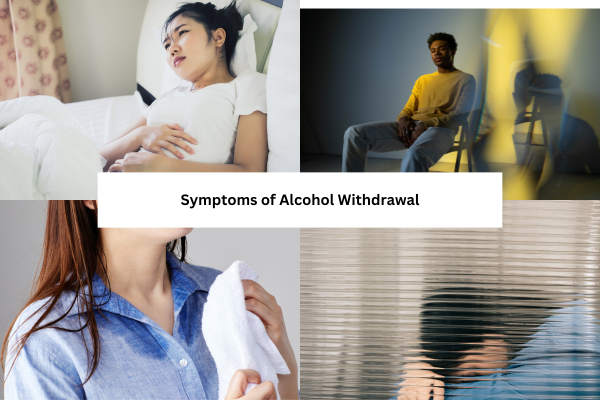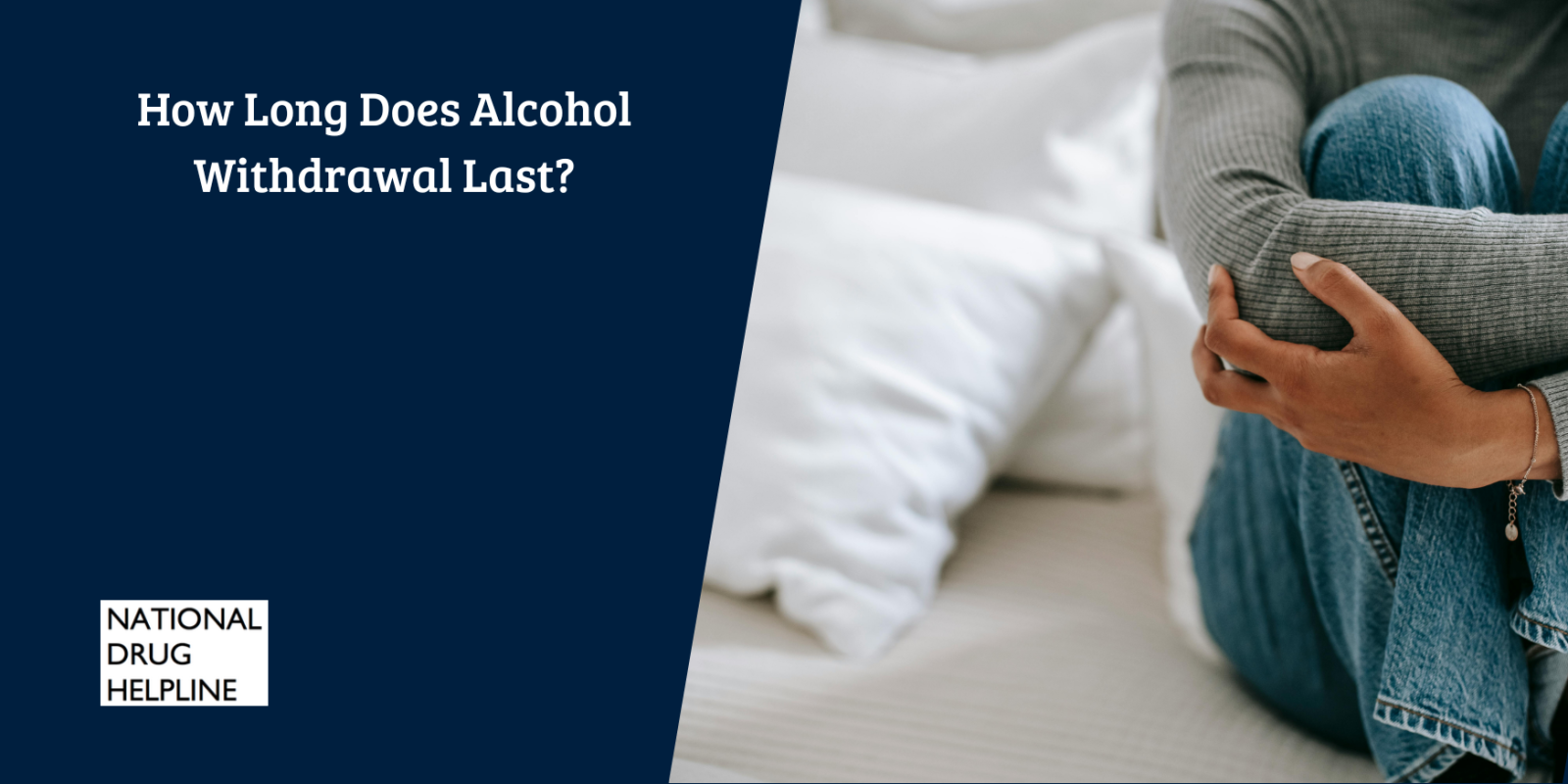If you or a loved one is trying to quit drinking, it is important to know about what can happen once you stop. Most alcoholics know that the withdrawal symptoms of alcohol is what make it so difficult to quit and therefore tend to relapse early on. But many do not know that alcohol withdrawal is just a temporary phase that has its limits. This article aims to answer this key question: how long does alcohol withdrawal last?
By understanding the timeline and symptoms of alcohol withdrawal, you can help prepare yourself for the process and seek appropriate care.
What Is Alcohol Withdrawal?
Alcohol withdrawal is a transient phase that occurs when someone who has been drinking heavily or for a prolonged period suddenly reduces or stops alcohol consumption. The brain and body that have gotten accustomed to the depressant effects of alcohol can struggle to rebalance themselves. [1] This can cause a range of physical and psychological symptoms.
Symptoms can vary widely depending on several factors. Some of them are the length and amount of drinking, individual health, and history of withdrawal episodes. Withdrawal is a serious condition that is best done under medical supervision.
How Long Do Alcohol Withdrawal Symptoms Last?
The duration of alcohol withdrawal can vary in different people. However, it usually follows a predictable course or pattern. Withdrawal symptoms begin within 6 to 24 hours after the last drink. It can then last from a few days to several weeks, depending on severity.
Typical Timeline of Alcohol Withdrawal
- 6 to 12 hours after last drink: Early symptoms begin, such as anxiety, irritability, headache, nausea, and mild tremors.
- 12 to 24 hours: Symptoms intensify; sweating, increased heart rate, and shaking become noticeable.
- 24 to 72 hours: This is the peak period where withdrawal symptoms are usually at their worst. Some may experience hallucinations or seizures during this time.
- 3 to 7 days: Most acute symptoms begin to subside but some psychological symptoms may persist.
- 1 to 2 weeks: Post-acute withdrawal symptoms like anxiety, mood swings, and sleep disturbances can linger.
- Several weeks or months: Some people experience protracted withdrawal symptoms that last for weeks or even months, often called Post-Acute Withdrawal Syndrome (PAWS).
Symptoms of Alcohol Withdrawal
Withdrawing from alcohol can feel like riding a roller-coaster of physical and emotional ups and downs. Knowing which symptoms crop up when—and how common they are—helps you spot warning signs early and reach out for help at just the right time.
Anxiety
When experienced: 6–12 hours after last drink
Typical signs: Restlessness, irritability, racing thoughts
How many suffer from it: About 60% of people in early withdrawal
That jittery knot in your chest and the sudden urge to pace around are your body’s first SOS signals.[2]
Tremors
When experienced: 6–48 hours after last drink
Typical signs: Fine to coarse shaking, usually in the hands
How many suffer from it: Roughly 70–80% during mild to moderate stages
Those uncontrollable hand shakes can make even pouring a glass of water feel impossible.
Nausea
When experienced: 6–12 hours after last drink
Typical signs: Queasiness, vomiting, loss of appetite
How many suffer from it: Around 40–50% of people entering withdrawal
Your stomach might rebel as it resets to life without alcohol, leading to waves of nausea that come and go.
Racing Heart
When experienced: 6–48 hours after last drink
Typical signs: Palpitations, pounding chest, shortness of breath
How many suffer from it: About 50% of individuals in early to moderate stages
That sudden sense that your heart’s about to burst through your ribs is stressful but fairly.
Sweating
When experienced: 6–12 hours after last drink
Typical signs: Clammy skin, night sweats, sudden drenching perspiration
How many suffer from it: Roughly 70% in early withdrawal
You might wake up soaked or find sweat dripping down your back even in a cool room.
Confusion
When experienced: 12–48 hours after last drink
Typical signs: Disorientation, trouble focusing, memory lapses
How many suffer from it: Approximately 30% during moderate withdrawal
Mental fog takes hold, making even the simplest tasks feel like a puzzle.

Hallucinations
When experienced: 12–48 hours after last drink
Typical signs: Seeing spots or flashes, hearing voices, feeling bugs crawling
How many suffer from it: Around 10–20% in moderate withdrawal
Your senses can betray you—images, sounds, or sensations appear that aren’t really there.
Delirium Tremens
When experienced: 48–72 hours after last drink
Typical signs: Severe agitation, high fever, profuse sweating, vivid hallucinations
How many suffer from it: About 5% of those with alcohol dependence
This is the most dangerous phase. Immediate medical care is critical if you notice these intense symptoms.
Seizures
When experienced: 48–72 hours after last drink
Typical signs: Convulsions, muscle rigidity, loss of consciousness
How many suffer from it: Roughly 3–5% in severe withdrawal
Seizures can be life-threatening. Don’t wait—call 911 or head straight to the ER.
Severe Agitation
When experienced: 48–72 hours after last drink
Typical signs: Extreme restlessness, irritability, potential aggression
How many suffer from it: Nearly 10% in severe stages
You may feel on edge or ready to snap—this level of agitation needs professional supervision.
Disorientation
When experienced: 48–72 hours after last drink
Typical signs: Inability to recognize people or surroundings, confused speech
How many suffer from it: About 5–10% during severe withdrawal
When you can’t tell night from day or struggle to recognize loved ones, it’s time for urgent help.
Factors That Influence How Long Alcohol Withdrawal Lasts
The length and severity of withdrawal symptoms depend on several factors:
- Duration and amount of alcohol use: Long-term, heavy drinking usually leads to more intense withdrawal.
- Previous withdrawal experiences: Repeated withdrawals can worsen symptoms (kindling effect).
- Co-occurring medical or psychiatric conditions: These may complicate and prolong withdrawal.
- Age and general health: Older adults or those with poor health may have longer withdrawal phases.
- Use of other substances: Concurrent drug use can influence symptom severity and duration.
What Is Post-Acute Withdrawal Syndrome (PAWS)?
While acute withdrawal symptoms generally resolve within a week, some people experience lingering symptoms for many weeks or months. This condition is called Post-Acute Withdrawal Syndrome (PAWS).
Symptoms of PAWS include:
- Anxiety or panic attacks
- Depression
- Mood swings
- Fatigue
- Difficulty concentrating (“brain fog”)
- Sleep disturbances
PAWS can make staying sober challenging but tends to improve gradually with time and appropriate support.
Can You Die from Alcohol Withdrawal?
Unfortunately, yes. If alcohol withdrawal results in severe complications such as delirium tremens or seizures, then it can be fatal. However, this can be easily prevented with proper medical supervision during alcohol withdrawal. Therefore, it is strongly recommended for heavy or long-term drinkers to go get professional help when you decide to quit.
If you or anyone you know are showing signs of severe withdrawal, such as confusion, hallucinations, seizures, or high fever, you must contact emergency services immediately.
How to Manage Alcohol Withdrawal Safely
You should never take alcohol withdrawal lightly as it can be fatal without medical supervision. Some key points to consider are[3]:
Medical Detox
- Inpatient or outpatient detox programs can provide medications to ease withdrawal symptoms and reduce risks.
- Medications like benzodiazepines are often used to prevent seizures and calm agitation.
- Monitoring vital signs and hydration is essential during detox.
Supportive Care
- Hydration and nutrition support
- Comfortable, calm environment
- Psychological support and counseling
If you or someone you know is suffering from alcohol misuse, do not hesitate to reach out to Drughelpline.org by calling our helpline for immediate support.
Ongoing Treatment After Detox
Withdrawal is just the first step. If you want to maintain sobriety and prevent relapse long-term, you need to continue treatment lifelong. Some methods to prevent relapse are:
- Counseling and therapy such as cognitive behavioral therapy
- Support groups such as Alcoholics Anonymous (AA)
- Medication-assisted treatment e.g., naltrexone, acamprosate
- Lifestyle changes and relapse prevention strategies
Conclusion
Alcohol withdrawal symptoms generally last from a few days to a week. The initial 24-72 hours is the most difficult period, as the most intense symptoms peak during this period. However, the psychological symptoms can continue for weeks or months.
Alcohol withdrawal can be unpredictable and dangerous, especially for heavy drinkers. Therefore, it is best to be managed under professional medical supervision. If you or someone you know is planning to quit drinking, you need to consult a healthcare provider first to discuss a safe withdrawal plan. Feel free to reach out to Drughelpline.org by calling our helpline for immediate support.
References
| ↑1 | Bayard, Max, et al. “Alcohol withdrawal syndrome.” American family physician 69.6 (2004): 1443-1450. |
|---|---|
| ↑2 | Rose, Steve. “Alcohol Withdrawal Symptoms and Timeline.“ |
| ↑3 | Gottlieb, Michael, Nicholas Chien, and Brit Long. “Managing alcohol withdrawal syndrome.” Annals of Emergency Medicine 84.1 (2024): 29-39. |

